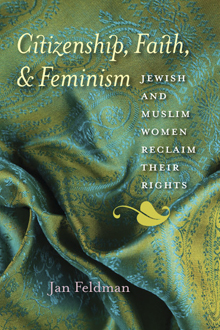Author sees religious women reclaiming rights
'Citizenship, Faith & Feminism' author Jan Feldman to launch book on campus

Does God hate women?
That, says Jan Feldman, author of a newly published book on the rights of Muslim and Jewish women, is a basic question that must be asked when considering whether a woman can be both religious and a feminist.
The book, “Citizenship, Faith & Feminism: Jewish and Muslim Women Reclaim Their Rights,” is the first in a new series by Brandeis University Press, in collaboration with the Jewish Press, examining gender, culture, religion and the law.
 |
| Read an excerpt from “Citizenship, Faith & Feminism” |
 |
The answer is in original religious texts – the Quran and the Torah. Feldman says in modern society, most women have access to the texts through which they can learn the answer is "no."
Feldman will read from her book at the Hadassah-Brandeis Institute (HBI) at 7 p.m. on Sept. 15. There will be a response by Zainab Alwani, the program director of Arabic Language and Islamic Studies at Northern Virginia Community College, a moderated discussion and a book signing.
“If there are misogynist voices here or claims made that are not in original texts, who is responsible for this?” Feldman asks. “Men took control early on and gave themselves a monopoly in religion.”
Feldman, a University of Vermont political science professor who was an HBI fellow in 2009, says it is a topic of personal interest and an offshoot of her previous book “Lubavitchers As Citizens: A Paradox.”
“I’m a participant observer. I have a dog in this race,” says Feldman, who identifies as an Orthodox Jewish woman and wants “to prove it’s not an oxymoron.”
Feldman’s book examines the feminist ideology of religious women in the United States, Israel and Kuwait. As a political scientist, she says, she chose her three case studies for specific reasons: Israel as a Jewish state that pioneered full equality for female citizenship, Kuwait because of its active women's movement and the United States as an outlier with a model liberal democracy.
“It’s an effort to discover for myself, and then persuade others, that women, who we often think of as duped and downtrodden and not as full actors in their own lives, are traditional by choice,” Feldman says. “No one is so isolated that they don’t know there are other options.”
Lisa Fishbayn, director of the HBI Project on Gender, Culture, Religion and Law, who, along with Sylvia Neil edits the series, says the main criterion is that the books creatively generate dialogue and illuminate overlaps in various cultures’ approach to gender, culture, religion and the law.
“There really is change happening, ” Fishbayn says.
Despite that change, Feldman says, the women in her case studies don’t see themselves as part of a radical reform movement.
“They see themselves as going back to original texts,” Feldman says. “Not reforming, but reclaiming. The primary reason women of reason don’t jump ship is to stay and reclaim their stake in religion.”
Categories: Humanities and Social Sciences, International Affairs






